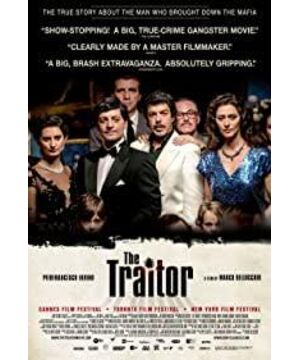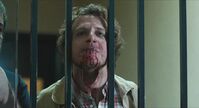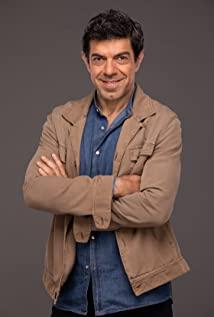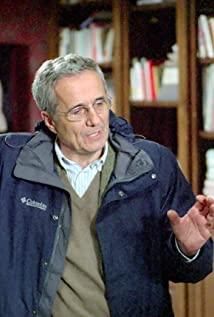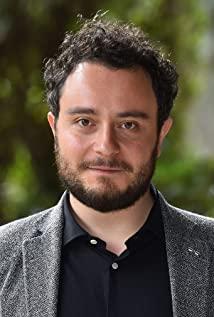The Italian Mafia- themed movies are so popular. It just so happened that last year they were shortlisted in the three major European film festivals. Berlin’s "Young Mafia" took the route of youth growth, and Venice’s "The Mafia was no longer what it used to be". An acclaimed documentary, and this Cannes "Traitor" is definitely the most solid and unique epic work in recent years. The 80-year-old Italian master director Marco Bellocchio became famous as early as the 1960s with " Outrageous ". He is good at shooting politically rich films and is deeply influenced by left-wing thoughts. His works It is often full of humanity depictions of rebellion and breaking through taboos. The Mafia subject was the subject he dabbled in for the first time, but his photographs showed a different taste, proving that the Italian director's treasured sword is not old and his thoughts are still active.
This "Traitor" is adapted from real events and tells the story of the gang leader Domaso Bussida who became a "traitor" in the early 1980s and gradually disintegrated the entire gang organization. The film opens with a seemingly harmonious scene of a gang gathering, crowded with people and relationships. Through this scene, the protagonist’s feelings of despair and eagerness to wash his hands are expressed, followed by a group photo taken by the gang members. This finishing touch hints at the fate of all the characters afterwards. It didn't take long for the narrative to reveal a terrifying face. A series of thrilling and violent assassination plots followed one after another, but these were obviously completely different from the gang fights we were used to, and they were more like an indifferent daily record, which appeared on the screen. The rolling numbers hint at the family members of the protagonist who lost their lives.
If this neat gang vendetta scene does not make you feel full, then the long court interrogation and debate afterwards may disappoint gang genre fans. In Belocchio's view, the focus of this work is not fighting and confrontation, but why the protagonist betrayed the Mafia organization and his life experience after becoming a "traitor" . This leads to the meaning of the title: Is the protagonist a "traitor"? A wonderful reminiscence plot narrated by the protagonist himself can be described as the key to understanding this huge and complex epic story. As a veteran figure of a gang organization, the protagonist is devoted to his duty to safeguard the unity and interests of the gang, abide by the rules of the gang, and never attack the elderly, women, or children. However, the reality is disappointing: Money has replaced morality . After he and his wife's family hid in Brazil, the family members who remained in Italy were repeatedly killed by members of the Mafia, and his two sons died at the hands of their former brothers. This brought him a heavy blow. After he repented, he chose to cooperate with the judiciary and stood up to testify against the members of the gang, and thus dismantled the entire Mafia organization.
From the protagonist's point of view, he is not a traitor at all, because all he has to deal with are members who break the rules of the gang and have bad intentions. In his opinion, these talents are true traitors. The protagonist’s principles and traditional morality have become a strong basis for his belief to support his testimony to other members in court. The plot also reveals that the traditional old-school concepts are incompatible with the new generation of gangs. Cutting into the narrative from the perspective of this "traitor" is the highlight of the film, which is different from other gangster themes. It allows the audience to objectively and fully understand the complex mentality and difficult process of the protagonist's betrayal of the organization. From this perspective, it seems to understand the reason why the focus of the play has shifted to the court trial plot. The director tried his best to show the various ugly behaviors of the gangsters in order to avoid interrogation, as well as the protagonist's language when confronted with them in the court. The lies in their mouths allow the audience to judge for themselves who is the "traitor".
The director did not use the conventional gangster type plot to write this alternative character biography, instead chose to use several important time nodes and cross-regional events to sort out the character's life and the opportunity of transformation. The timeline runs from the beginning of the 70s, to the 80s when the protagonist was arrested in Brazil, to the 90s after his release from prison, and until his final death. The characters also went from Italy to Brazil, then back to Italy, and then to the United States. The vicissitudes of life have a very heavy epic background . This episode of the protagonist’s final career reminds me of "The Irishman" by Martin Scorsese, another master director last year . The protagonists of the two films are members of the dying gang, who have witnessed their journey from glory to the end of decline. The protagonist could have spent his twilight years in the United States, but found that he could not accept to live on his wife and was living in a panic under the shadow of threats, so he chose to return to Italy again to accuse the gangsters and the tangled political forces behind the scenes.
Although the director Belocchio is eighty years old, his gangster work reveals a strong sense of rhythm in the calm narrative : passionate sex scenes, sharp and straightforward assassination passages, and dignity and harmony. The scene of the court debate provided ample perspective for this complex narrative text. Several stunning dream passages portray the protagonist’s guilt towards his family vividly. The animal montages of trapped animals continue the classical temperament exclusive to European directors, while the opera episodes and Brazilian pop music that appear from time to time have a distinctive hint and irony, whether it is the violence carried out by gangs or law enforcement agencies. The duality of elegance and brutality, especially the scene where the Brazilian police threatened the protagonist with a helicopter. The beginning of the gang assassination section and an explosion and crash shot from inside the car near the end reminds people of Bellocchio’s best political style in his early years, full of violent mania and perilous atmosphere.
The actor Pier Francesco Favino 's performance made people gaze at the whole time. He will defend the complex human nature between the morality and values of the gang and the actual conflict of interest. His performance was definitely one of the best in last year's Cannes competition, comparable to Antonio Banderas in "Pain and Glory". Although he missed the Cannes actor last year, he won the honor of the Venetian actor with another work this year, which once again proved the simple and simple saying that gold always shines, and good actors will always be seen and recognized by all.
View more about The Traitor reviews


